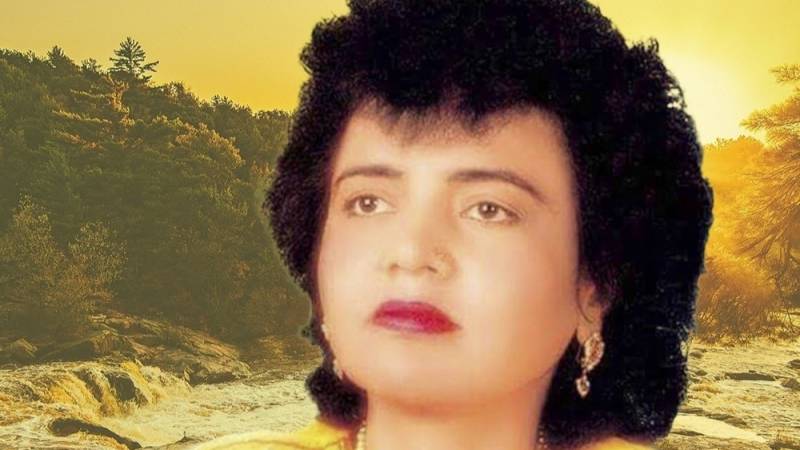
Pakistan was enthralled by the emergence of the 'pop' and 'rock' genres of music on mainstream television and airwaves in the 1990s with the likes of Nazia Hasan, Vital Signs, Junoon and Awaz, among many other solo artists. Amidst the growing cacophony, a voice emerged from the deserts of Tharparkar that went on to rule the hearts of those who heard her across Sindh.
In the 1990s, any time you would travel through a part of Sindh where the urban-centric mainstream media did not beam its television or radio broadcasts, you would find the air filled with the melodious voice of local legend Fozia Soomro.
Soomro dominated Sindh's music for more than a decade, bringing about a quiet revolution in local music, specifically proving to be a boon for local and obscure poets.
She passed shortly after the turn of the century, but 21 years later,many still remember her music. With her death anniversary having come and gone earlier this week, let's take a look back at her career.
Soomro, who was often dubbed the melody queen of Sindh by her fans due to her soul-soothing voice, was born as Hakeema in Tharparkar in 1966 to a sugar mill worker, Nathoo Khan Soomro.
She spent her childhood in Tando Muhammad Khan, where her father worked. She got a knack for singing after practising at weddings and other social and celebratory events.
Soon, she started getting invited to events to sing. The small honorariums support her family's meagre financial resources.
Her first big break came when she she was given an opportunity to serenade those listening to the radio. At the ripe age of 17, her voice reverberated across the airwaves of Radio Pakistan from its Hyderabad studios. Director Naseer Mirza oversaw Hakeema's transformation into Fozia Soomro as she sang her first song: "Beqadra Qadar Na Kae".
The song soon gained popularity, bringing Fouzia immense fame across the province.
Listeners fell in love with her peculiar voice. The voice was powerful enough to carry over into the Sindhi-speaking regions of neighbouring India. Her choice to expand her skills beyond just Sindhi endeared her to those who spoke Urdu, Marwari and Dadtki languages -- which are spoken in desert regions of India as well.
Some of her top hits include numbers such as "Wah Chari Dilri", "Muhinja Piyar Piyara, Roh Roh K Dil De Raha hai Dubai", "Muhinjo Tun Hi Dildar" and "Kahen Hath Hilaya".
Soon, Soomro became a household name in Sindh. She recorded several songs for Radio Pakistan and Pakistan Television in Sindhi and Urdu languages.
Contribution to Sindh's poetry
Take any great or even a not-so-great singer but one whose songs have reverberated with the public at large. The one factor you find common among them, apart from the strength of their skills, is perhaps the poetry that forms the bedrock of their music.
This is what Soomro leveraged.
Realizing the power of her songs, she opted to forego celebrated and time-tested poets such as Lal Shahbaz Qalandar and incorporate poetry written by more obscure poets of Sindh such as Ali Muhammad Uderai, Bilawal Otho, Sain Dad Sand and Qasir Nawaz.
Their poetry added the emotions of the subjugated classes of Sindh and depicted the feelings of those deceived in love. It kept Fozia Soomro connected to her roots and, thus, her diaspora.
This also resonated with the general public, and Fozia Soomro's melodious voice found more listeners.
Following in the footsteps of illustrious female singers of Sindh, such as Mai Baghi, Jiji Zareena Baloch and Mahi Soni, Soomro also played a vital role in promoting the traditional folk music of Sindh.
A genuine connection with Thar
Poet Bilawal Otho, whose poetry Fozia Soomro had lent her voice, shared that the late singer had a heartfelt affiliation with Thar and its people. Through her songs, Otho said, Soomro attempted to promote and project the beauty of the arid region.
Ashraf Shaher, a poet from Sujawal who, too, had developed a musical relationship with the singer, said that she would visit him whenever she travelled to Hyderabad to record at the Manjar musical company.
"I was sitting with singer Taj Mastani in the recording room when we received the shocking news of her demise," he said, adding that he and Taj started weeping in unison.
Connecting with the people
Habib Malah, a tractor driver from Sujawal, recalled that they would play her songs late at night while tilling barren lands under the full moon's light.
"Her soothing voice would solace to us," he said.
People living in remote areas of Sindh had a special attachment to Soomro.
"Mothers would play her songs to calm their children so that they could sleep peacefully," said Hamed Jat, who still listens to her songs.
He added that Fozia Soomro's songs would help heal the heart's wounds.
Harsh turns in life
Away from public life, however, Fozia Soomro enjoyed a less-than-ideal life.
Her life suddenly turned after her husband, Misri Sathio, divorced her.
It devastated her emotionally. But her singing helped her through the tough period. Her health, on the other hand, kept deteriorating.
She left this world on September 4, 2002, battling kidney-related diseases. She was handed over to the Earthly realm at the Burrah Shah Graveyard in Tando Muhammad Khan.
She was survived by a daughter, Sidra, who decided to stay away from the profession of singing after the crisis she faced in the aftermath of her mother's passing.
Before she departed this Earth, the iconic Sindhi singer had received several accolades, including the Shah Latif Award and the Misri Shah Award, in recognition of her remarkable contributions to Sindhi music. And 21 years after her passing, she continues to tug at the heartstrings of those who walk Sindh's hinterlands.

